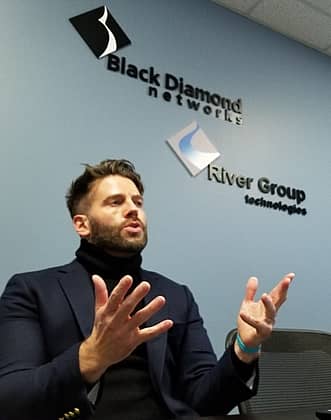
Meet Ben Locwin, a Life Sciences subject matter expert with Black Diamond Networks, supporting our clients in Project Solutions and beyond. He has worked internationally with pharmaceutical and medical device companies, as well as tech companies and investors changing the face of population health.
His most recent work has been on vaccinology and virology advisory boards, and the front lines of the national coronavirus pandemic, participating in State and Federal Task Forces, and providing recommendations for government and private sector response amid its continued impact to public health and world economies.
We recently sat down to discuss the pandemic, vaccines, and even scurvy. Here’s more from our recent conversation.
Elizabeth Aragao: Welcome to Black Diamond Networks, Ben. Can you tell me a little about what motivates you to do the work you do every day?
Ben Locwin: Thanks! I’m so excited to be here and to get started.
When I look out at the landscape of the world in which we live, I see a lot of adversity, a lot of challenges. But in my mind, none are as ubiquitous as public health. As global life expectancy inches upward, it brings with it a very large group of people who have just entered, or will be entering senescence (old age). This in turn brings about a number of particular healthcare challenges, including greater cancer case rates, more numbers of diseases of old age – such as Alzheimer’s and other forms of dementia, and so forth. Population health is what drives me every day; that intensity to improve those things that we do within humanity to make the world a better place.
I’m also cognizant of the fact that it’s difficult sometimes for people in general to care about the population as a whole – because it’s a ‘problem of large numbers’ and seems very abstract. But let me put it another way: We are all – or will be – patients of the future. Whether it’s a medication you take, a surgery you’ve undergone, or just know someone close to you going through a health crisis – we are all interconnected in this.
“If we don’t take risks and attempt new things, we can never get better.”
EA: In an industry with so much ingenuity, what in the past shapes the things we do today?
BL When I think about where this industry – all of it – comes from, it really owes its existence to James Lind. He was a Scottish fellow who was aboard the HMS Salisbury in 1747, and the work he did trying to cure scurvy in the sailors became ostensibly what was the first controlled clinical trial. Let me give you a bit more detail here, because his story is a very interesting one: Conventional wisdom was that more British sailors were lost to scurvy than to French and Spanish armed conflict. Clearly a problem in need of solution! He subdivided 12 sailors aboard the ship into 6 pairs and gave each pair a different treatment (by way of dietary changes), and in this way did the first systematic study of the relationship between scurvy and diet.
EA: So what can people take away from this?
BL: Trying matters. If we don’t take risks and attempt new things, we can never get better. It’s like the quote “If you always do what you’ve always done then you’ll always get what you’ve always got.” But my caveat here: These can’t be random attempts – they should be based in smart approaches with purposeful execution and based in fact. And smart measurement matters.
“The vaccines, and their stellar successes were not the result of random chance, but by the application of proper scientific practices.”
EA: 2020 certainly was a year of attempting new things. Of all that was accomplished in life sciences, what was the most surprising – or inspiring?
BL: Ah yes, quite a year. Clearly, nothing stands up against the rapidity with which we developed a usable vaccine for SARS-CoV-2 during the global pandemic. Before many people even had heard about the virus, the genetic sequence was already shared by Chinese scientists and development labs went to work. I was already – by February – answering questions from the media about whether this particular virus was an engineered bioweapon with the 30,000-letter genetic code in-hand. Maybe it’s telling that the first place people go is to the conspiracy theories (laughs).
The backside of the story you don’t hear is that we had candidate vaccines dosed to participants last April. What we all witnessed at humanity-scale, was the conduct of a giant application of the scientific method vis-à-vis the clinical trials. The vaccines, and their stellar successes were not the result of random chance, but by the application of proper scientific practices.
“All challenges bring opportunities in their wake.”
EA: What does that mean for 2021?
BL: I think we’re in an interesting space right now, which is moving from the past and courting a bright future. In the healthcare industry in particular, there are many changes, both in terms of technology and regulatory changes, that will continue to shape the landscape, and of course, the opportunities therein.
I’ve been speaking with regulatory authorities, and they’ve each shared challenges that they themselves have as a result of the fallout from COVID-19. I’m keeping a close eye on this moving frontier – on the boundary of what we know and what we don’t yet know – to find opportunities. But all challenges bring opportunities in their wake.
“As public health goes, so too goes all business and the economy.”
EA: Anything else you’d like to hit on that we haven’t covered?
BL: With 2 mRNA COVID-19 vaccines authorized for use, and several others finalizing their Phase 3 clinical trials, we’ll continue to see dramatic change in public health; and as public health goes, so too goes all business and the economy. I see so many untapped opportunities, that we really can invent the future within which we’d each like to live.

